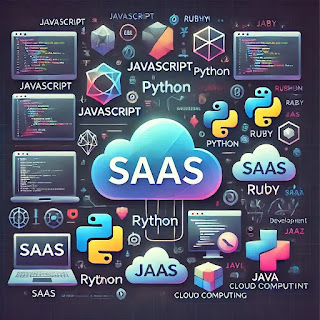The success of a SaaS application relies heavily on its underlying technology stack. The programming language you choose for development can impact scalability, performance, and overall user experience. In this post, we’ll explore the best SaaS programming languages in 2024, considering factors like performance, ease of use, community support, and integration capabilities.
Why Choosing the Right Programming Language Matters for SaaS
The right programming language for your SaaS product can help streamline development, improve product performance, and enable faster scaling. Here are a few key factors to consider when selecting a programming language:
- Scalability: Can the language handle growth as your app gets more users?
- Performance: Is it optimized for speed and responsiveness?
- Community Support: Does it have an active developer community for troubleshooting and updates?
- Integration Capabilities: Can it easily integrate with other tools and technologies?
1. JavaScript (Node.js)
- Why It’s Great:
JavaScript is one of the most versatile programming languages, and with Node.js, it becomes an excellent choice for SaaS applications. Node.js allows you to build scalable, high-performance applications due to its non-blocking I/O operations. It’s especially great for real-time applications like chat systems and collaboration tools. - Key Features:
- Asynchronous programming.
- Easy integration with databases.
- Strong community and large ecosystem.
- Best For: Real-time apps, APIs, and microservices.
2. Python
- Why It’s Great:
Python’s simplicity and readability make it a popular choice for SaaS development. It’s easy to learn and can be used for a wide range of applications, from web development to data analysis. Python is well-suited for backend development, data science, machine learning, and automation. - Key Features:
- Strong libraries for web development (Django, Flask).
- Ideal for AI and data-driven SaaS apps.
- Large and supportive community.
- Best For: Data analytics, machine learning, and web development.
3. Ruby (Ruby on Rails)
- Why It’s Great:
Ruby on Rails is a popular web development framework for building scalable and maintainable SaaS applications. Rails offer many built-in functionalities, which speeds up the development process. It’s an excellent choice for startups looking to build a product quickly. - Key Features:
- Convention over configuration.
- Quick prototyping and development.
- Active community and robust libraries.
- Best For: Rapid development, MVPs, and startups.
4. Java
- Why It’s Great:
Java is known for its robustness and scalability, making it a top choice for large-scale enterprise SaaS applications. It’s widely used for building secure, high-performance systems that need to handle large volumes of transactions. - Key Features:
- Object-oriented programming (OOP) principles.
- Strong security features.
- Cross-platform support.
- Best For: Enterprise-grade applications, banking, and finance SaaS.
5. PHP
- Why It’s Great:
PHP remains a popular choice for web development, especially for SaaS products built around content management systems (CMS) and e-commerce. Its integration with MySQL and ease of deployment make it an attractive option for developers. - Key Features:
- Easy integration with databases.
- Large number of frameworks (Laravel, Symfony).
- Extensive documentation and tutorials.
- Best For: Content-heavy SaaS apps and e-commerce platforms.
6. Go (Golang)
- Why It’s Great:
Go, also known as Golang, is a fast and efficient language designed by Google. It is well-suited for building highly scalable SaaS applications that need to handle large volumes of requests. Go is used by large companies like Uber and Dropbox for their backend infrastructure. - Key Features:
- High concurrency handling.
- Fast execution speed.
- Excellent for microservices architecture.
- Best For: High-performance SaaS apps, microservices, and cloud services.
7. TypeScript
- Why It’s Great:
TypeScript is a superset of JavaScript that offers static typing, making it easier to manage complex applications. It provides better tooling, enhanced code quality, and better scalability for large SaaS applications. - Key Features:
- Type-safe code with better error handling.
- Integrates seamlessly with JavaScript frameworks (React, Angular, Vue).
- Great for large-scale applications.
- Best For: Complex web applications, enterprise SaaS products.
8. C# (.NET Core)
- Why It’s Great:
C# with .NET Core is a popular choice for building cross-platform SaaS applications. Its integration with Microsoft Azure makes it ideal for businesses already using the Microsoft ecosystem. - Key Features:
- Strong support for web APIs and cloud services.
- Scalable and secure.
- Cross-platform compatibility with .NET Core.
- Best For: SaaS products requiring strong backend systems and cloud integration.
Conclusion: Choosing the Right Programming Language for Your SaaS Product
Selecting the right programming language for your SaaS application is crucial for its success. JavaScript (Node.js), Python, Ruby, and Java are among the best programming languages in 2024, each excelling in different areas based on your specific requirements. When choosing, consider your team’s expertise, scalability needs, and long-term goals for the product.
Need help picking the right tech stack for your SaaS project? Let us know in the comments, or reach out for personalized advice!








No comments:
Post a Comment